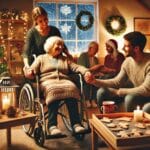
Hospice at the Holidays By: Jillian Lisiakowski, DNP, FNP-C, ACHPN
November 18, 2024
Morphine Myths By: Jillian Lisiakowski, DNP, FNP-C, ACHPN
December 18, 2024Holiday Health Safety
By: Jillian Lisiakowski, DNP, FNP-C, ACHPN
The holiday season can be a busy, joyous time filled with good food, travel, and visiting with family and friends. This can also be a time when individuals with complex medical conditions or those on hospice services are at greater risk for adverse events and complications. Awareness of choking hazards and foods that may cause increased edema or swelling is essential. It is also important to ensure patient safety by reducing risks of falls and by planning and preparing for travel no matter how short the trip. Here are some tips to keep your loved ones safe and feeling their best during the holiday season.
Choking Awareness
As we experience chronic medical conditions and approach our later years, choking can become more of a risk. Certain medical conditions can weaken the muscles in the neck and mouth that normally help us swallow the foods we enjoy. Those same muscles often weaken as we approach end-of-life, and eating foods such as meat and thin liquids becomes difficult without choking. Older adults also often suffer from dry mouth due to reduced saliva production or side effects from medication1. Poor-fitting dentures also increase the risk of choking as they move around the mouth while eating or drinking1. During the holiday season, there is usually an increase in the variety and the amount of food available. Frequently, meals are enjoyed with family or friends where people are also talking and visiting simultaneously. It is important to pay close attention to your loved ones who are older or on hospice services during this time, as they may struggle to eat the food being served or may begin to choke without notice.
Common foods that cause choking include2:
- Water or other thin liquids
- Meat that is dry or in large pieces
- Fish or chicken with bones
- Hard candy
- Crackers and other dry foods
- Bread
Some tips to lessen the risk of choking include utilizing thickeners in thin liquids like water and fruit juice. You can also offer thicker soups, puddings, or shakes that are easier to swallow. Also, offer chopped meat or cut it into smaller, manageable pieces. Meat such as turkey or steak can become dry or chewy, causing difficulty chewing and increasing the chances of choking. Avoid service chick legs or chicken/fish that still contain bone. Avoid foods such as bread and crackers, as these can quickly expand and become sticky when combined with a liquid. Instead, choose foods like mashed potatoes or soft sweet potatoes. Instead of crackers, go for cut apples or bananas or perhaps a soft cookie.
Sodium and swelling
Salt is a common ingredient used in almost every recipe. We often consume more sodium during holidays due to the amount and types of food we eat during this season. Recipes that contain canned ingredients, such as soups, condensed soups, vegetables, and sauces, typically contain high amounts of sodium. Other foods that are high in sodium include canned gravy, salted nuts, salted butter, bread, lunch meats, and cured meats. While these foods are delicious, the increased sodium intake can cause increased swelling or edema, leading to increased shortness of breath.
As we consume more sodium, our body retains extra fluid and sodium to help balance the space inside and outside the cell. This extra sodium affects how fluid moves in and out of your cells. For healthy individuals, this is often quickly resolved by the body, causing minimal swelling. However, in older adults, patients with heart or kidney conditions or those with poor circulation usually experience uncomfortable symptoms after consuming large amounts of sodium. Swelling in the lower legs is a common symptom after heavy sodium intake. This can be uncomfortable and make walking difficult, lead to skin breakdown, and increase blood pressure. Fluid retention can also cause shortness of breath, especially in patients with heart failure. Medications, such as diuretics (water pills), may be required to assist in excreting excess fluid. Oxygen may help the patient decrease the feeling of shortness of breath until fluid levels return to normal.
To avoid these complications, consider making these simple switches:
- Consider homemade sauces and soups with less sodium.
- Utilize seasonings that are low or no sodium.
- Looked for canned soups and vegetables labeled Low Sodium.
- Switch from salted to unsalted butter.
- Drink plenty of water (be sure to follow any prescribed fluid restrictions)
Fall risks
With more visitors around the holiday come crowded rooms, more personal belongings, and less walking space. This can lead to an increased risk of falls for members who are unsteady on their feet or those dependent on medical equipment. An individual unfamiliar with their environment, such as when visiting a family member’s home, may be unaware of steps or rugs, which can lead to a fall. To reduce the risk of a fall and resulting injuries, consider these tips:
- Place gifts, bags, and other belongings in designated areas away from walkways.
- Remind your loved one to ask for help when ambulating and encourage them to utilize their medical equipment, such as a cane or walker.
- Place chairs around the perimeter of the room to leave the middle open.
- Consider the use of a wheelchair if traveling.
- Offer to prepare a plate of food for your loved one so they can remain seated.
- Consider removing rugs
- Be mindful of oxygen tubing and machines
Notify the healthcare team
Finally, the healthcare team is there to support you and your loved ones during this holiday season. Be sure to notify them of any travel plans. If you are traveling out of state, they may be able to work with a local hospice to be available for any needs. Ensure you have the proper medical equipment, such as oxygen, that can be safely transported, as well as walkers or wheelchairs, to reduce the risk of falls. Provide updated contact numbers, and be sure to have your healthcare team’s contact information with you in case a need arises. Finally, ensure you take enough medication to last the entire trip. Consider taking a few extra days’ worth of medication in case there is a change in plans. Communicate with your healthcare team if any medication refills are needed.
These four tips can improve the safety of your loved ones this holiday season. Monitoring for choking hazards and reducing sodium intake can reduce the need for emergency services and improve overall comfort. Implementing fall precautions will reduce the risk of falls and injury. Working with your healthcare team can lead to a seamless holiday plan. The holidays can become stressful and overwhelming for those with chronic conditions, but proper planning and communication can lead to a meaningful and enjoyable season with friends and family.
References
- Quilter, D. (n.d.). Avoiding choking hazards in the elderly. https://www.cdss.ca.gov/agedblinddisabled/res/VPTC2/9%20Food%20Nutrition%20and%20Preparation/Avoiding_Choking_Hazards_in_the_Elderly.pdf
- Ohio Department of Aging. (n.d.). Choking. Health & Safety. https://aging.ohio.gov/care-and-living/health-and-safety/Health-and-safety-resources/choking#:~:text=Common%20causes%20of%20choking%20in%20older%20adults%3A%201,texture%20if%20you%20are%20on%20a%20special%20diet.

